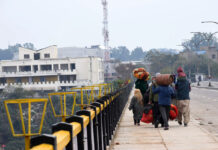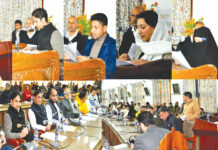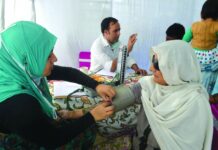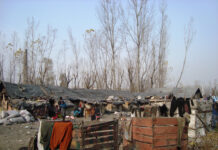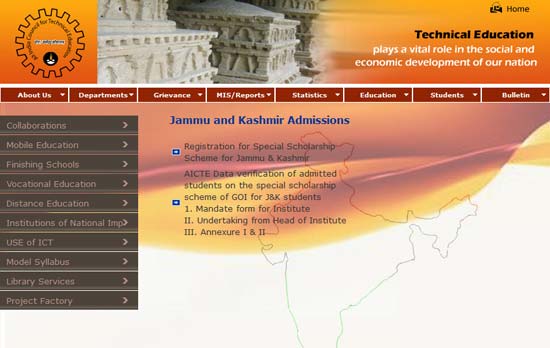Journalist Iftikhar Gilani was part of media team that accompanied Prime Minister Manmohan Singh to Russia. Dr Singh had a 40-minute close-door meeting with Pakistan president Asif Ali Zardari in Yekaterinburg on the sidelines of Shanghai Cooperation Organisation (SCO) summit. On way home, Dr Singh talked about Kashmir and made his concerns public. Here is a first hand account.
Off late, Prime Minister Dr Manmohan Singh seems to have left his typical coyness miles behind. Be his reaction to L K Advani’s charges of a “weak prime minister” or an imposing message to Pakistan President Asif Ali Zardari at the Russian city of Yekaterinburg, his journey from a suave and sophisticated gentleman to a politically shrewd and assertive authoritarian is glaring.
Analysts are still debating whether his blunt message to Pakistan President Asif Ali Zardari within earshot of reporters was a diplomatic faux-pas or an astutely choreographed move aimed at critics back home who might see the meeting as a softening of India’s stance. Many agree that he killed two birds with one stone – succumbing to American pressure to re-start dialogue with Pakistan but limiting talks only to terrorism and Pakistan’s report card.
At the Russian city of Yekaterinburg soon after the Shanghai Cooperation Organisation (SCO) meeting ended, Pakistan President walked into ball room in Hyath Hotel waiting for the Prime Minister Dr Singh. Attired in a black suit, he even cracked jokes with selected India-Pakistan journalists who were allowed to cover the event. Six minutes later, Dr Singh walked in and greeted Pakistan President and shook hands with entire delegation. Returning to Zardari, the combatant Singh said “I am very happy to meet you” in front of journalists who had gathered for a photo-op of the first meeting between the two leaders since the 26/11 Mumbai attacks.
In an apparent departure from protocol, Manmohan Singh seized the opportunity to convey what an official called a “front-loaded message”. “But I must tell you quite frankly that I have come with the limited mandate of discussing how Pakistan can deliver on its assurances that its territory would not be used for terrorists attacks on India,” Manmohan Singh said.
Visibly shaken Zardari took a while to regain composure. Pointing towards journalists he bought a smile on his face telling Prime Minister, to let journalists go before they could begin their talks. Pakistan President himself asked us to move out and even escorted to door. Five minutes later, we saw Pakistan Foreign Minister Shah Mehmood Qureshi and his entourage also joining us in the corridor. Later Indian delegation including National Security Advisor M K Narayanan and Foreign Secretary Shiv Shankar Menon also came out leaving both leaders in a closet.
When asked if Prime Minister’s attitude towards Pakistan President was diplomatically pungent, Qureshi disagreed. Waiting in the corridors he said Pakistan’s demand of resumption of dialogue has been accomplished. He also promised to hold a full-fledged press briefing after the meeting was over to share details with Indian media entourage. After 40-minutes Qureshi and Menon were summoned in, indicating end of the one-to-one meeting. While Menon told us he would address a press conference after an hour in the same hotel upstairs, Qureshi left in hurry and even did not respond to telephone calls.
Dr Singh’s attitude had shaken Zardari’s confidence so much so, he could not raise Kashmir issue during his one-to-one meeting. At a time when Kashmir was politically boiling in the aftermath of Shopian incident, many believed levers had returned to Pakistan to beat India at the international forums and to at least score diplomatic point during bilateral talks.
On board, Prime Minister said there was no discussion on Kashmir. “He (President Zardari) did not raise it nor did I raise it,” was his curt reply when asked whether there was a discussion on Kashmir. “He did mention to me the difficulties that Pakistan is facing in containing terrorism and asked us to bear with him, give him some more time. But there was no mention of Kashmir at anytime in our discussions,” he added.
Analysts maintain the blunt message was an attempt to mobilise support of the international community against terrorism from Pakistan amid a growing perception that western powers were losing interest after expressing outrage over the Mumbai carnage seven months ago.
“The message was aimed at hawks back home who might be tempted to elevate the meeting into a resumption of the (sub-continental) dialogue and use it to portray it as a sign of the government’s weakness,” said an official source, who did not want to be named. “There is nothing unstructured when the two leaders meet,” said the official.
There was more in store in the prime minister’s political acumen after Zardari incident. Immediately after his on-board press conference ended, Dr. Singh came to me, saying, “We have not lost hopes about Kashmir”. I prompted, “Sir but our youth in Kashmir has lost hopes in New Delhi.” He replied “We mustn’t (loose hope). I know there are concerns.”
I mentioned the police’s initial refusal to register a case in Shopian incident and unaccountability in security administration. Just when he was conversing, all the officials – National Security Advisor, Foreign Secretary and the entire media entourage – had gathered around us. He said, “That (Shopian) was a disturbing incident. I recognise the agony of the people. We should make every effort to ensure there is zero tolerance to human rights violations.”
I mustered courage to suggest whether his government can launch a project similar to project tiger or operation protect elephant to save Kashmiri people from hunters (security men). He smiled and said, “Don’t loose hope, have courage” as he walked away to his chamber in the Air India 1, the special plane flying prime minister to his foreign trips.
Earlier in the press conference, Dr Singh disagreed with the suggestion that his government was not concerned about the situation in Kashmir. “The home minister was there, he made some important statements about the redeployment of forces. It is very unfortunate these incidents have taken place. If there are any violations of human rights, I will take effective action,” he promised.
The prime minister stressed that he would be happy to hold dialogue with any groups, “and I mean any groups” interested in talking to the government. “We would welcome even those groups who are not in the political mainstream. If they have any views, we are quite willing to discuss with them,” he said.
When I pointed out inconsistencies in dialogues as Hurriyat had conducted two sets of discussions with him, he revealed, “In the past, I invited the Hurriyat [Conference] and twice they came. They said they would send us a proposal. They never sent us any proposal. They said there were too many people detained. I asked them to give me a list of those people they felt were detained without purpose. They never gave [the list]. But I am not complaining. We are willing to engage in dialogue with anyone who is willing to shun the use of the gun.”
Analysts are still debating whether his blunt message to Pakistan President Asif Ali Zardari within earshot of reporters was a diplomatic faux-pas or an astutely choreographed move aimed at critics back home who might see the meeting as a softening of India’s stance. Many agree that he killed two birds with one stone – succumbing to American pressure to re-start dialogue with Pakistan but limiting talks only to terrorism and Pakistan’s report card.
At the Russian city of Yekaterinburg soon after the Shanghai Cooperation Organisation (SCO) meeting ended, Pakistan President walked into ball room in Hyath Hotel waiting for the Prime Minister Dr Singh. Attired in a black suit, he even cracked jokes with selected India-Pakistan journalists who were allowed to cover the event. Six minutes later, Dr Singh walked in and greeted Pakistan President and shook hands with entire delegation. Returning to Zardari, the combatant Singh said “I am very happy to meet you” in front of journalists who had gathered for a photo-op of the first meeting between the two leaders since the 26/11 Mumbai attacks.
In an apparent departure from protocol, Manmohan Singh seized the opportunity to convey what an official called a “front-loaded message”. “But I must tell you quite frankly that I have come with the limited mandate of discussing how Pakistan can deliver on its assurances that its territory would not be used for terrorists attacks on India,” Manmohan Singh said.
Visibly shaken Zardari took a while to regain composure. Pointing towards journalists he bought a smile on his face telling Prime Minister, to let journalists go before they could begin their talks. Pakistan President himself asked us to move out and even escorted to door. Five minutes later, we saw Pakistan Foreign Minister Shah Mehmood Qureshi and his entourage also joining us in the corridor. Later Indian delegation including National Security Advisor M K Narayanan and Foreign Secretary Shiv Shankar Menon also came out leaving both leaders in a closet.
When asked if Prime Minister’s attitude towards Pakistan President was diplomatically pungent, Qureshi disagreed. Waiting in the corridors he said Pakistan’s demand of resumption of dialogue has been accomplished. He also promised to hold a full-fledged press briefing after the meeting was over to share details with Indian media entourage. After 40-minutes Qureshi and Menon were summoned in, indicating end of the one-to-one meeting. While Menon told us he would address a press conference after an hour in the same hotel upstairs, Qureshi left in hurry and even did not respond to telephone calls.
Dr Singh’s attitude had shaken Zardari’s confidence so much so, he could not raise Kashmir issue during his one-to-one meeting. At a time when Kashmir was politically boiling in the aftermath of Shopian incident, many believed levers had returned to Pakistan to beat India at the international forums and to at least score diplomatic point during bilateral talks.
On board, Prime Minister said there was no discussion on Kashmir. “He (President Zardari) did not raise it nor did I raise it,” was his curt reply when asked whether there was a discussion on Kashmir. “He did mention to me the difficulties that Pakistan is facing in containing terrorism and asked us to bear with him, give him some more time. But there was no mention of Kashmir at anytime in our discussions,” he added.
Analysts maintain the blunt message was an attempt to mobilise support of the international community against terrorism from Pakistan amid a growing perception that western powers were losing interest after expressing outrage over the Mumbai carnage seven months ago.
“The message was aimed at hawks back home who might be tempted to elevate the meeting into a resumption of the (sub-continental) dialogue and use it to portray it as a sign of the government’s weakness,” said an official source, who did not want to be named. “There is nothing unstructured when the two leaders meet,” said the official.
There was more in store in the prime minister’s political acumen after Zardari incident. Immediately after his on-board press conference ended, Dr. Singh came to me, saying, “We have not lost hopes about Kashmir”. I prompted, “Sir but our youth in Kashmir has lost hopes in New Delhi.” He replied “We mustn’t (loose hope). I know there are concerns.”
I mentioned the police’s initial refusal to register a case in Shopian incident and unaccountability in security administration. Just when he was conversing, all the officials – National Security Advisor, Foreign Secretary and the entire media entourage – had gathered around us. He said, “That (Shopian) was a disturbing incident. I recognise the agony of the people. We should make every effort to ensure there is zero tolerance to human rights violations.”
I mustered courage to suggest whether his government can launch a project similar to project tiger or operation protect elephant to save Kashmiri people from hunters (security men). He smiled and said, “Don’t loose hope, have courage” as he walked away to his chamber in the Air India 1, the special plane flying prime minister to his foreign trips.
Earlier in the press conference, Dr Singh disagreed with the suggestion that his government was not concerned about the situation in Kashmir. “The home minister was there, he made some important statements about the redeployment of forces. It is very unfortunate these incidents have taken place. If there are any violations of human rights, I will take effective action,” he promised.
The prime minister stressed that he would be happy to hold dialogue with any groups, “and I mean any groups” interested in talking to the government. “We would welcome even those groups who are not in the political mainstream. If they have any views, we are quite willing to discuss with them,” he said.
When I pointed out inconsistencies in dialogues as Hurriyat had conducted two sets of discussions with him, he revealed, “In the past, I invited the Hurriyat [Conference] and twice they came. They said they would send us a proposal. They never sent us any proposal. They said there were too many people detained. I asked them to give me a list of those people they felt were detained without purpose. They never gave [the list]. But I am not complaining. We are willing to engage in dialogue with anyone who is willing to shun the use of the gun.”


